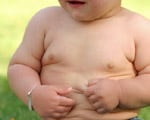Babies who are still drinking from a bottle at 2 years of age may be prone to obesity by the time they turn 5 years old.

Experts agree that obesity prevention should begin before children enter school. But due to a lack of conclusive data, health care providers often have trouble advising parents about which interventions are the most beneficial. A new study in America suggests that limiting prolonged bottle use in children may be an effective way to help prevent obesity.
For the study, researchers analysed data on 6,750 children who participated in the Early Childhood Longitudinal Study, Birth Cohort, a large national study of children born in 2001to estimate the association between bottle use at 24 months of age and the risk of obesity at 5.5 years of age. Children were considered obese if their body mass index [BMI, a ratio of weight to height] was at or above the 95th percentile for their age.
About 22 percent of the children continued to use bottles regularly at 2 years of age, meaning they mainly drank from a bottle or were put to bed with one. About 23 percent of the children who drank from a bottle at age 2 years were obese, compared to about 16 percent of kids who'd stopped using a bottle by age 2 years, making them about 33 percent more likely to be obese than children who were weaned sooner. This finding persisted even after accounting for other factors such as the mother's weight, the child's birth weight, and feeding practices during infancy.
One likely explanation is that children who are still drinking from a bottle at age 2 years are probably consuming more calories than they need. The authors suggest that weaning children from the bottle by the time they are 1 year of age is unlikely to cause harm and may prevent obesity.
DoctorNDTV is the one stop site for all your health needs providing the most credible health information, health news and tips with expert advice on healthy living, diet plans, informative videos etc. You can get the most relevant and accurate info you need about health problems like diabetes, cancer, pregnancy, HIV and AIDS, weight loss and many other lifestyle diseases. We have a panel of over 350 experts who help us develop content by giving their valuable inputs and bringing to us the latest in the world of healthcare.












